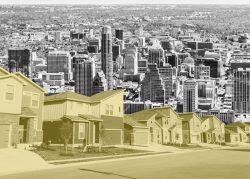Five Texas counties were among the 10 fastest growing in the U.S. last year.
Counties surrounding large cities including Dallas, Houston and Austin recorded an influx in residents from July 1, 2020, to July 1, 2021, according to population estimates from the U.S. Census Bureau. The Texas suburbs have seen an abundance of moving vans in recent years as companies, newcomers and Texans move in droves across the state. Migration trends such as these are useful for developers and investors interested in the Texas real estate market.
The Dallas-Fort Worth-Arlington metro area added more than 117,000 people last year across Collin, Denton, Tarrant, Kaufman and Rockwall counties, which is the most new residents overall. Dallas County recorded the fastest decline in estimated population growth in the state at 27,489 people, according to the data.
Lila Valencia, demographer for the city of Austin, said the trends happening in the Dallas area show people trading the city for the suburbs while the population growth across the Austin metro tells the story of a tight housing market and a fast-recovering economy. The Austin-Round Rock-Georgetown metro recorded the quickest population growth in the state with 3.02 percent more residents across Bastrop, Caldwell, Hays, Travis and Williamson counties than the year prior. The Austin metro has been the fastest-growing large metro in the U.S. for a full decade.
Though the data only encompasses population growth through July, Valencia said Hays, Williamson and Bastrop counties continue to swell and squeeze the area’s housing market.
“During the pandemic, some moves took place to more rural areas, like Bastrop, where you would have more space and less risk,” Valencia said of the county southeast of Austin. “But it’s mostly people having to deal with the tight housing market in the Austin metro area. When they’re not able to find a home that they can purchase, they’re going to look further out into places like Bastrop.”
Williamson County — where Samsung Electronics is planning a $17 billion plant in Taylor and Apple is developing a $1 billion campus in North Austin — added 34,009 people last year, making it the fourth fastest-growing county in the state by raw numbers. Hays County, southwest of Austin, grew by almost 6 percent, putting it in fifth place overall.
The Houston area also recorded swift population growth in Fort Bend County, with an influx of 35,748 residents, and Montgomery County, where 28,443 people moved last year. Harris County, including the city of Houston, lost 3,115 people.
“Some of those losses in the urban core centers of the Houston metro and the Dallas metro are people who are not only just moving to their surrounding counties, but also to the Austin metro,” Valencia said.
The Texas capital’s fast recovery from the pandemic is a factor, she said.
Most new residents to the Austin metro were already Texans, Valencia said. To be sure, the migration of people out of California is still apparent, though the recent population estimates don’t indicate exactly where the ex-Californians are moving to. It’s estimated that the population of the Bay Area, including San Francisco, Alameda and San Mateo counties, fell by more than 119,000 while Los Angeles County alone lost almost 184,500 people.
Read more


